The 5G FRMCS Operational Phase course offered by Wray Castle Ltd is designed to provide professionals in the telecommunications industry with the essential knowledge and skills needed to effectively manage and optimize the operation of 5G FRMCS (Future Railway Mobile Communication System) networks. This comprehensive course covers a wide range of topics related to the operational phase of 5G FRMCS networks, including network planning, configuration, performance monitoring, troubleshooting, and optimization.
The course is ideal for network engineers, system integrators, project managers, and other professionals who are involved in the deployment and operation of 5G FRMCS networks. By completing this course, participants will gain a deep understanding of the key principles and best practices for managing 5G FRMCS networks, enabling them to enhance network performance, reliability, and efficiency.
The 5G FRMCS Operational Phase course is delivered through a combination of live virtual sessions, self-paced modules, interactive labs, and real-world case studies. Participants will have access to industry-leading instructors who have extensive experience in the field of telecommunications and technology training. The course also includes practical exercises and hands-on labs to reinforce learning and ensure that participants can apply their knowledge in real-world scenarios.
Upon successful completion of the course, participants will receive a certificate of completion from Wray Castle Ltd, demonstrating their expertise in the operational phase of 5G FRMCS networks. This certification can help professionals advance their careers and stand out in a competitive job market.
Overall, the 5G FRMCS Operational Phase course offered by Wray Castle Ltd is a valuable resource for professionals looking to enhance their skills and knowledge in the field of telecommunications and technology training. With its comprehensive curriculum, expert instructors, and hands-on learning opportunities, this course is a must-have for anyone involved in the operation of 5G FRMCS networks.
5G: FRMCS Operational Phase
-
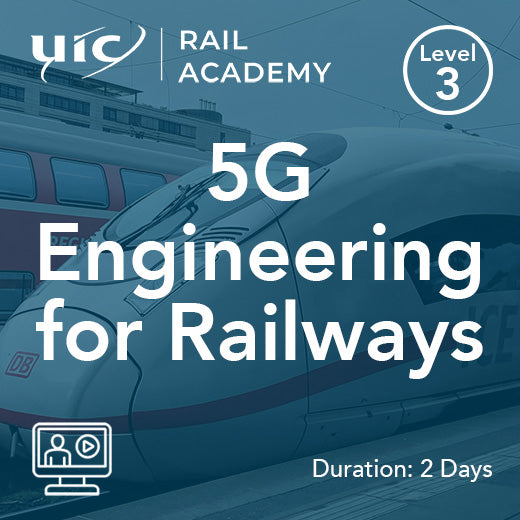
5G Engineering for Railways
This 5G Engineering for Railways course is a technical introduction to 5G. The course includes the design goals and development schedule for 5G, the principles, design and implementation of the 5G air interface, radio access network and core network, and the operation of the 5G system. With the emergence of FRMCS our 5G Rail portfolio addresses the technical requirements of FRMCS. Who would benefit This course is intended for engineers either new to, or already working in, mobile communications. Prerequisites Familiarity with telecommunications and general engineering terminology is assumed. Some understanding of LTE cellular systems would be beneficial. Topic Areas Include 5G introduction, key features and standardisation Use cases and performance objectives Principles of the air interface: radio spectrum, OFDMA and multiple antennas Air interface protocol stack Architecture of the air interface physical layer Procedures for data transmission and reception on the 5G air interface Radio access network architecture and protocols Non-standalone and standalone deployment options Core network architecture and protocols Network function virtualisation and network slicing Interworking and compatibility between 5G, LTE and Wi-Fi PDU connectivity, Quality of Service and service provision Signalling procedures in the 5G network
POA: Private Course
-
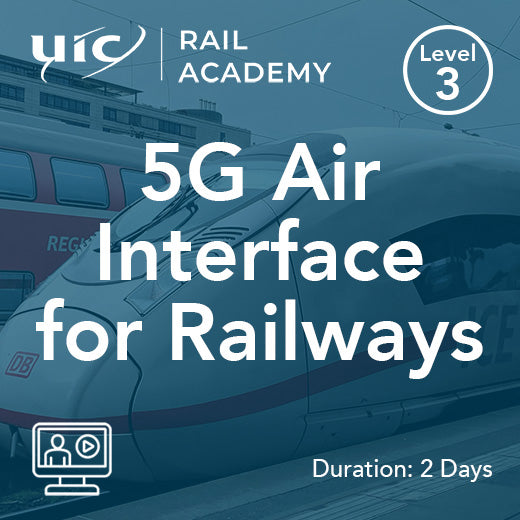
5G Air Interface for Railways
This 5G Air Interface for Railways training course is a detailed technical description of the air interface for the 5G New Radio (5G NR). It covers the principles of millimetre wave and multiple antenna communications, the architecture and implementation of the air interface’s physical layer, the higher layer air interface protocols, and the signalling procedures for idle and active 5G devices. With the emergence of FRMCS our 5G Rail portfolio addresses the technical requirements of FRMCS. Who would benefit The course is intended for engineers and other staff who are involved with equipment design, operation, optimization or monitoring on the 5G air interface. Prerequisites An engineering background with some knowledge of general radio principles and digital radio systems is assumed. A basic understanding of 5G and experience of LTE radio systems would be desirable. Topic Areas Include: 5G introduction, use cases and standardisation Radio spectrum and millimetre wave communications Principles and implementation of multiple antennas in 5G Architecture of the air interface physical layer Details and implementation of the 5G physical, transport and logical channels Air interface procedures for synchronisation, scheduling, data transmission, feedback and random access Dual connectivity architecture and protocol stacks
POA: Private Course
-
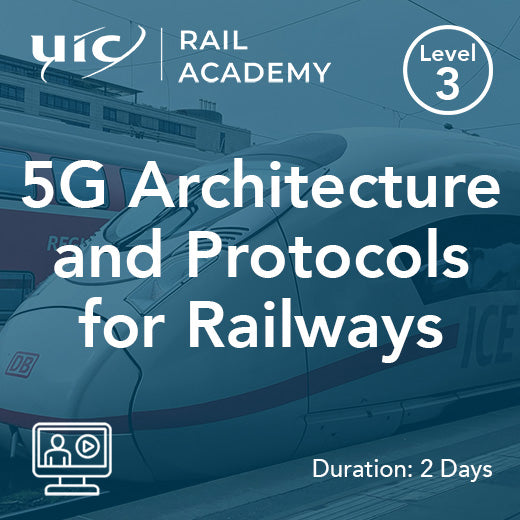
5G Architecture and Protocols for Railways
This 5G Architecture and Protocols for Railways training course is a detailed technical description of the core and radio access networks of 5G. It covers the architecture and interfaces used by 5G, the protocols used for signalling and data transport, the provision of services over a 5G network, and the procedures for signalling and system operation. With the emergence of FRMCS our 5G Rail portfolio addresses the technical requirements of FRMCS. Who would benefit The course is intended for engineers and other staff who are involved with the architecture, optimization, management, monitoring or testing of the 5G network. Prerequisites An engineering background with some knowledge of core and radio access network technologies is assumed. A basic understanding of 5G and experience of LTE networks would be desirable. Topic Areas Include: 5G introduction, use cases and standardisation Radio access network architecture and deployment options Network architectures for dual connectivity Architecture of the 5G core network Network Function virtualisation, slicing and orchestration Interworking and compatibility between 5G, LTE and Wi-Fi PDU connectivity, Quality of Service and service provision Control plane and user plane protocols in the 5G network Implementation of network function services using HTTP/2 Signalling procedures for registration, security and session management Network operation in Idle, Inactive and Connected modes Optional 5G Virtual Lab Module Explore, Test, Optimise, and Troubleshoot the 5G System Deep dive into the key signalling scenarios in the 5G system and analyse the output to build a deeper understanding that goes beyond the theoretical. The lab is a fully emulated 5G System environment that enables you to experiment with the configurations for Network Functions and build customized settings for signalling scenarios that helps you to develop greater insight into the operation of the 5G System. Lab modules can be added to any relevant 5G course. Learn more and arrange a demo.
POA: Private Course
-
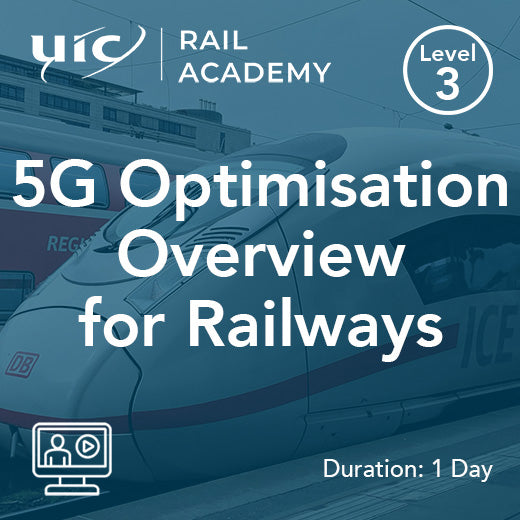
5G Optimisation Overview for Railways
5G Optimisation Overview for Railways provides an introduction to the principles of parameter setting and optimisation in the Next Generation Radio Access Network (NG-RAN). The material covered includes cell configuration, signal measurements, and parameters in idle and connected mode. With the emergence of FRMCS our 5G Rail portfolio addresses the technical requirements of FRMCS. Who Would Benefit? This course is intended for experienced radio access optimisers, and for those involved with device development or functionality testing in 5G systems. Prerequisites The course assumes an engineering background, with some knowledge of digital radio systems in general and the 5G air interface in particular. Experience of parameter tuning and optimisation for LTE would be useful. Course Contents Fundamentals of the 5G Air Interface RSRP, RSRQ and SINR Parameter Setting
POA: Private Course
-
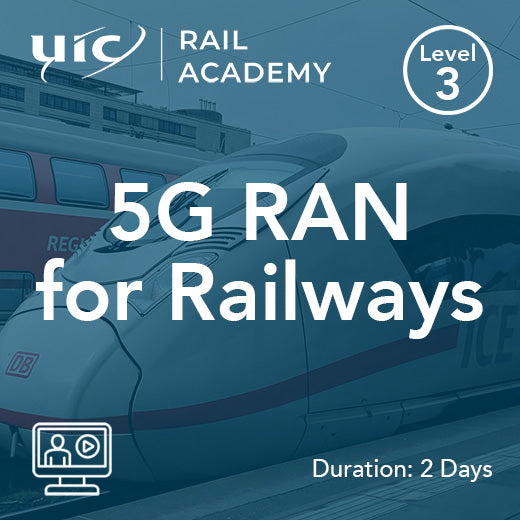
5G Radio Access Network for Railways
The 5G Radio Access Network for Railways course begins by discussing the key features of a 5G network before delving into the finer detail of the 5G New Radio. The 5G RAN is described in terms of network architecture, base station characteristics, spectrum usage and multiple antenna configurations. The transport of signalling and traffic over the 5G RAN interfaces, fronthaul and backhaul are analysed followed by an in depth study of the signalling protocols used over those interfaces. With the emergence of FRMCS our 5G Rail portfolio addresses the technical requirements of FRMCS. Who Would Benefit Engineers that need to know about the 5G Radio Access Network in terms of its characteristics, architecture, interfaces and operation Pre-requisites Ideally attendees will have a mobile telecommunications or radio background gained from the study of or working with GSM, UMTS or LTE networks. Topic Areas Include Introduction to 5G 5G RAN NG Interface Messages and Procedures Xn Interface Messages and Procedures E1 Interface Messages and Procedures F1 Interface Messages and Procedures Multi-RAT Dual Cennectivity Optional 5G Virtual Lab Module Explore, Test, Optimise, and Troubleshoot the 5G System Deep dive into the key signalling scenarios in the 5G system and analyse the output to build a deeper understanding that goes beyond the theoretical. The lab is a fully emulated 5G System environment that enables you to experiment with the configurations for Network Functions and build customized settings for signalling scenarios that helps you to develop greater insight into the operation of the 5G System. Lab modules can be added to any relevant 5G course. Learn more and arrange a demo.
POA: Private Course
-
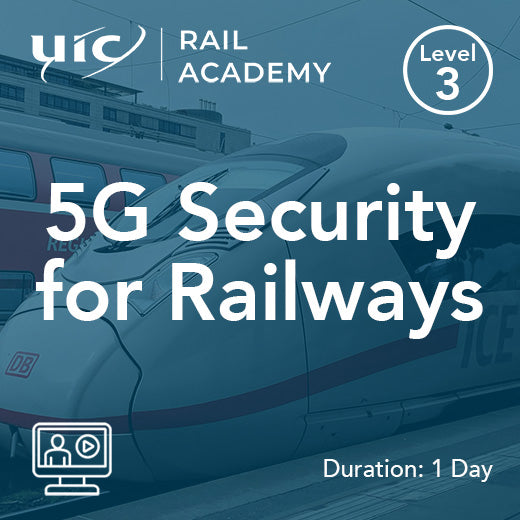
5G Security for Railways
The nature of 5G means that the security architecture and processes need to cover new aspects (when compared to previous 3GPP generations), including 5GNR/LTE Dual Connectivity, standardized interfaces for distributed gNB / RAN architectures, more tightly integrated Non-3GPP Access, and most significantly, the new Service Based Interfaces used within the 5G Core. The 5G Security for Railways course provides a comprehensive grounding in this expanded set of security requirements and mechanisms used in 5G. We start by considering the 5G architecture in order to better understand the overall security requirements for both the UE and network. We then build on the security architecture of 4G LTE, with relevant modifications and additions required for 5G, before focusing squarely on the additional features and procedures required to secure the 5G Core Network (Service Based Interface). With the emergence of FRMCS our 5G Rail portfolio addresses the technical requirements of FRMCS. Who would benefit This course is designed for engineers, managers and other personnel who have a need to acquire a technical overview of the security environment employed within 5G networks. It will also be of benefit to those in the wider technical community who have a need to understand the security protocols employed by advanced cellular networks. Prerequisites An understanding of 4G (and legacy 2G and 3G) security procedures would be an advantage as would a basic understanding of 5G and / or LTE network architecture and functionality. Topic Areas Include 5G Architecture and the Service Based Interface 5G Security Architecture and Authentication and Key Agreement Security and the Service Based Interface (including SEPP)
POA: Private Course
-
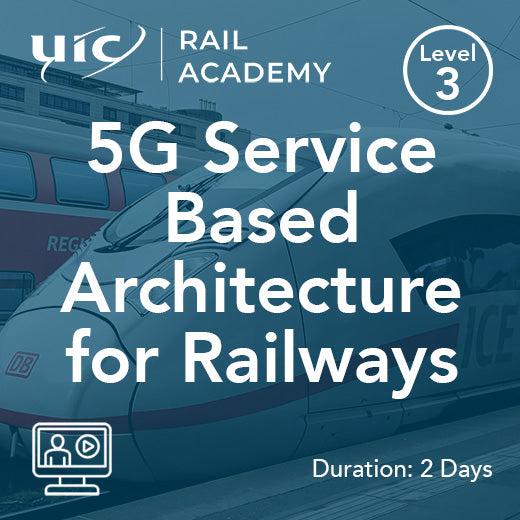
5G Service Based Architecture for Railways
5G Service Based Architecture for Railways training course expores the Core Network Functions , including their overall purpose, their specific role within the SBA, and the features / services that they support. This is followed by a comprehensive survey of the 5G Core and SBA supporting protocols and technologies, as well as a thorough examination of the Service Based Interface (SBI) and Service APIs (Application Programming Interfaces). Example procedures then allow us to build a comprehensive picture of the relevant techniques and features, and to make sense of the way in which the SBA is consistent with, and supports, key 5G enabling principles - including virtualisation and network slicing. Finally, security on the SBI is explored, highlighting the new network functions and techniques that have been introduced with 5G to provide new security features (including the roaming scenario), and a more secure core network domain. With the emergence of FRMCS our 5G Rail portfolio addresses the technical requirements of FRMCS. Who would benefit This course is designed for those involved in the design, deployment and development of the 5G Service Based Architecture and the 5G Core. Prerequisites This is a technical course, so experience or knowledge of the 5G system from a technical perspective would be an advantage. Topic Areas Include 5G Introduction and Deployment Options The 5G Core Network Functions 5G Core Supporting Protocols and Technologies The Service Based Interface (SBI) and Service APIs Explained Procedures Deployment options SBI Security Optional 5G Virtual Lab Module Explore, Test, Optimise, and Troubleshoot the 5G System Deep dive into the key signalling scenarios in the 5G system and analyse the output to build a deeper understanding that goes beyond the theoretical. The lab is a fully emulated 5G System environment that enables you to experiment with the configurations for Network Functions and build customized settings for signalling scenarios that helps you to develop greater insight into the operation of the 5G System. Lab modules can be added to any relevant 5G course. Learn more and arrange a demo.
POA: Private Course
-
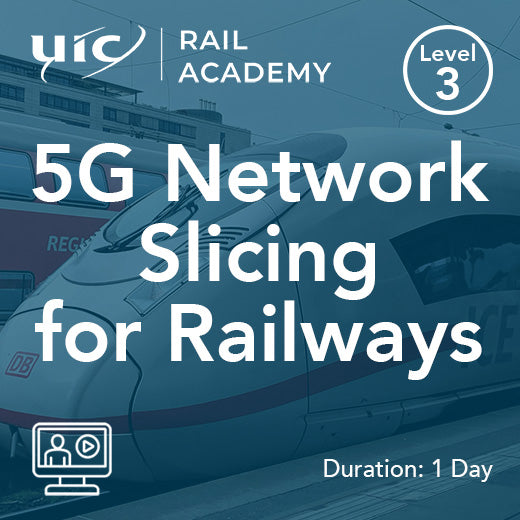
5G Network Slicing for Railways
This 5G Network Slicing for Railways course examines 5G network slicing and those topics that impact and drive slice strategy. Service and Industry requirements are explored, as well as use case performance objectives. Technical aspects of 5G slice operation are followed by an appraisal of the techniques available to map the requirements onto a practical slice. A generic slice template, and associated attributes, are then used to generate an example slice specification. Finally, practical slice deployment and management options are investigated. Examples are used throughout. With the emergence of FRMCS our 5G Rail portfolio addresses the technical requirements of FRMCS. Who would benefit This course is designed for those involved in the design, deployment and commercialisation of 5G. Prerequisites Although we begin with an introduction to 5G and use case requirements, the course focuses on the technical aspects of network slicing, so some experience or knowledge of the 5G system from a technical perspective would be an advantage. Topic Areas Include Introduction to 5G, Use Cases and Connectivity 5G Slicing Slice Development and Deployment Optional 5G Virtual Lab Module Explore, Test, Optimise, and Troubleshoot the 5G System Deep dive into the key signalling scenarios in the 5G system and analyse the output to build a deeper understanding that goes beyond the theoretical. The lab is a fully emulated 5G System environment that enables you to experiment with the configurations for Network Functions and build customized settings for signalling scenarios that helps you to develop greater insight into the operation of the 5G System. Lab modules can be added to any relevant 5G course. Learn more and arrange a demo.
POA: Private Course





















